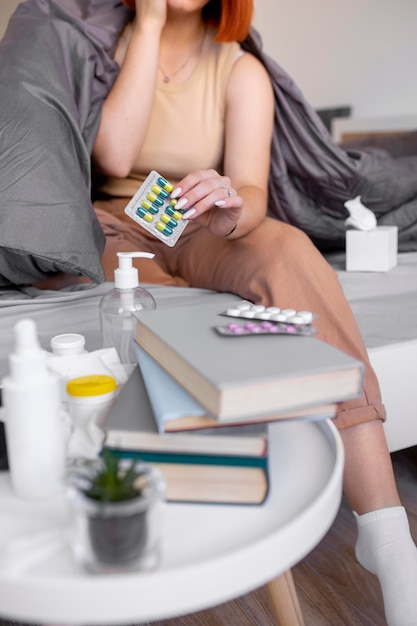
Depression has become a major health issue, with the number of people affected rising quickly. In our high-tech world, everyone is constantly striving to achieve their goals, which leads to a lot of stress and worry. Surveys show that women take more antidepressants than men for understandable reasons.
Overthinking, lack of sleep, and unhealthy eating habits often contribute significantly to depression. Our busy lifestyles often make us neglect our own well-being, leading to ongoing distress and irritability.
Women are excelling in all areas of work, but their responsibilities are often heavier than men’s. They not only manage household and family duties but also handle work-related pressures. Depression affects happiness and brings on unnecessary overthinking, high blood pressure, and other mental health issues.
Depression isn’t permanent—there are numerous reliable antidepressants available after consulting a psychiatrist. Since more women experience depression than men, they are the main consumers of these medications.
**Causes of Women Taking More Antidepressants than Men:**
**Sexual Harassment:**
Sexual harassment is a significant cause of depression in women, with increasing rates worldwide. Incidents of rape and abuse among teenagers and other women result in anxiety, stress, and ultimately, depression. The aftermath of these events severely impacts victims, diminishing their self-respect and confidence, and often leading to social isolation.
**Stress:**
Women are generally more prone to stress than men. They often overthink and get easily panicked, which disrupts their mental peace. Surveys indicate that women are more affected by serious events than men, leading to mental health issues. Factors like sexual harassment, domestic violence, and heavy responsibilities contribute to this. Work and parental responsibilities, especially for single mothers, increase stress and the likelihood of depression, leading to higher antidepressant use.
**Parental Responsibilities:**
Women often take on greater parental duties, caring for their children and managing household tasks. This dual role—combined with other responsibilities—can lead to anxiety, stress, and depression. Single mothers, working hard to meet their responsibilities, are particularly vulnerable to depression and may need to rely on antidepressants.
**Environmental Factors:**
A woman’s surroundings, including relationships, work, and social expectations, can lead to feelings of sadness or dissatisfaction when expectations aren’t met. Unmet desires for love and respect can cause mood disorders, sadness, and ultimately, depression. These mental issues can also manifest as physical problems like body pain and tiredness.
**Gender Gap:**
Depression often stems from mood disorders, and studies suggest women are more prone to these throughout their lives due to hormonal changes. Starting from puberty through pregnancy and menopause, hormonal fluctuations can cause anxiety, stress, and mood disorders, all potentially leading to depression.
**Unbalanced Sexual Life:**
Irregular sexual activity can disrupt a woman’s emotional state, causing depression. Dissatisfaction in one’s sex life can lead to feelings of hysteria and other mental health issues. Maintaining a healthy sexual relationship is important to prevent these negative outcomes.
**Treatment:**
**Antidepressants:**
Antidepressant medications are commonly used to treat depression in both men and women. Women, facing high levels of stress and responsibilities, often find relief with these medications. Different types of antidepressants work in various ways to address mental issues, but they can also have side effects like affecting sexual desire or causing other physical problems.
**Psychotherapy:**
Another effective treatment for depression is psychotherapy, which includes:
1. **Cognitive Behavioral Therapy (CBT):** Helps patients eliminate negative thoughts that undermine their confidence and happiness.
2. **Interpersonal Therapy:** Focuses on resolving relationship issues and conflicts.
3. **Psychodynamic Therapy:** Explores a patient’s history to identify deep-rooted sources of emotional pain.
Each treatment’s success depends on the patient’s response, and many find relief through a combination of antidepressants and therapy. Women are encouraged to be aware of depression’s causes and seek support from loved ones to avoid the overthinking that may necessitate antidepressants.